- Home
- Patricia MacLachlan
My Father's Words Page 3
My Father's Words Read online
Page 3
“The cow
Coming
Across the grass
Moves
Like a mountain
Toward us”
Then Joe began a very energetic version of Where the Wild Things Are.
“Wild thing!” Joe called over and over again.
Marco and Billy began barking. I had never heard barking in the rescue room before. It was usually so sadly quiet.
“I need Jenny,” I said to Martha.
Martha nodded and looked at Luke.
“I’ll take Lulu if she’s here. We have come to an understanding.”
Martha laughed.
Luke and I went out the door, up and down the lawns, across the street to a park. We sat on a bench, and Jenny sat close, looking up at me. I patted her.
Lulu jumped up on the bench and lay down next to Luke. It was peaceful.
“Maybe Thomas should have a dog,” I said in the quiet.
“You can tell him that tonight when he calls,” Luke said.
“Meatball night already? So soon?”
“Yes.”
Jenny nosed my hand as if to say, “It’s all right. It’s all right.”
We got up and walked back through the park, across the shelter lawn, and when we opened the door, Martha was grinning at us.
The rescue room door was ajar.
Music was playing. It was Finn’s small tape deck. It was an orchestra playing “Dona Nobis Pacem.” My father’s song.
I pushed the door open and looked in. Joe and Penny were sitting still. The dogs were listening to Finn’s music. I walked in, trying to be quiet. When I came closer, Finn looked up at me and smiled.
Emma sat far closer to Finn, much closer than she’d ever been.
She looked up and saw me. I was very still, afraid I’d scare her. But I didn’t. She sat there, looking and listening. She looked at me, then back at Finn, as if assuring herself that Finn and I were family. We were safe.
And then she lay down, listening to the music. Finn and Emma and I didn’t move. We didn’t move until the music ended.
Finn got up. “I’ll be back,” he whispered to Emma.
We walked out past Penny and Joe, and when I looked back, Emma was still there.
Emma had come away from the wall.
My meatballs were sizzling.
The phone rang.
“Hello?”
“Hello, Fiona.”
“Hello, Thomas.”
“How are you? How is Finn?”
“My friend Luke found something for Finn. He is working with a shelter dog whose owner died.”
“That’s a good thing.”
“Luke is an only child, like you. His father once wrote him a poem about being a father. The last line was ‘And I’m the light that will never go out.’”
Thomas sighed.
“Your father once said the same thing to me. He said, ‘There’ll always be the sun. Always the sun.’ It’s a light that never goes out.”
“Do you have a dog, Thomas? The shelter woman says that people sometimes need dogs to teach them how good they are.”
“I have a cat,” said Thomas.
“Then the cat will let you know how good you are,” I said.
I could almost feel Thomas smile through the phone.
“My cat is a hisser, a talker, and a scratcher. I rescued him off the streets.”
“See? You are really, really good!”
“Maybe you’re right.”
“Today Finn played ‘Dona Nobis Pacem’ for Emma the dog. She moved closer to him.”
“Your father loved music. I’m a singer, and he always said, ‘Keep on singing!’”
“Sometimes I forget things about him.”
“Memories are good. At least your father thought so. ‘Maybe the reason you and I are here is to collect memories,’ he once said.”
“Is that what we’re doing?” I asked.
“Yes. It is what we’re doing. I’ll call you again next week, Fiona.”
“Good-bye, Thomas.”
“Good-bye, Fiona.”
I hung up.
Collecting memories.
I stirred the meatballs in the pan.
And suddenly I remembered my father telling me that dona nobis pacem was Latin for “grant us peace.”
“What’s better than that?” he says. “Peace. Besides, it annoys your mother when I sing it to her when we’re playing tense competitive basketball.”
We both laugh.
How was it I’d forgotten that? It had been lost. But it wasn’t anymore.
I was collecting memories.
Chapter 7
Comfort
My mother and Finn and I sat in the kitchen after dinner. I could hear the katydid sounds outside, like dusk music.
My father holds up his finger when he hears that sound. “Summer song,” he says.
“What?” asked my mother, seeing the look on my face.
“That sound.”
“He liked it. ‘Katydid, Katydidn’t,’” my mother said.
“He knew the songs of the oriole, the cardinal, the veery by the river, and the high call of the sharp-shinned hawk,” said Finn, ticking them off on his fingers.
My mother and I looked at each other, surprised. Finn was beginning to talk as much as Luke was these days.
“You remembered all that,” said my mother.
“And I listened. Like Emma,” said Finn. “She liked ‘Dona Nobis Pacem’ when I played the tape for her.”
“Your father’s song. He used to sing it to me in a fierce basketball game so I’d get distracted,” said my mother. “Imagine the nerve of him singing a gentle song meaning ‘grant us peace’ when I was trying to beat him up in basketball.”
Finn and I grinned at each other, remembered it working from time to time.
“You know, Finn, maybe you should sing to Emma. You have a beautiful voice, and I think animals react to voices,” said my mother.
“Do dogs like music?” I asked.
She shrugged. “Maybe, maybe not,” she said. “I mostly know about young children. Not dogs. Young children respond to singing.”
“Maybe dogs and young children are alike,” Finn said with his thoughtful look. He peered at my mother.
“Right now you look just like your father,” she said softly.
She was right. My father’s direct and thoughtful look as if he was just discovering the thing he’d say next.
“So maybe it is not the stories I’ve been reading,” said Finn. “Maybe it’s my voice that Emma likes.”
“Thomas said Father once told him, ‘Keep on singing,’” I said.
“Who is Thomas?” asked Finn.
“A very wise friend of Father’s,” I said.
My mother smiled.
It was quiet then in the kitchen.
“Is there a music school in town?” asked Finn idly.
“Well, there is the Chance Conservatory,” said my mother. “Over on West Avenue, across the park from the shelter.”
Finn looked up as if startled.
“Chance? Is that the name?” asked Finn.
“Why are you asking?” said my mother.
“Just wondering,” he said.
I remember my father once watching Finn look out the window in winter as the snow fell.
“What are you doing?” my father asks.
“Just wondering,” Finn says.
“Just wondering is good,” my father says.
“Actually, I’m making a plan,” said Finn. “Emma’s owner who died was named David Chance. Martha told me.”
“Shall I ask what the plan is?” I said.
“No,” said Finn.
The only sounds were the katydids’ steady soft song as dusk turned into night.
Katydid, Katydidn’t.
Katydid, Katydidn’t.
Katydid, Katydidn’t.
Memories.
At the shelter Finn went right into the rescue room as if he lived there now.
“Joe and Penny are not here today,” said Martha. “It’s pretty quiet in the rescue room.”
Jenny came right over, looking up at me. I knelt down and hugged her.
I thought of Finn’s words about the dogs liking the sound of a voice.
“I’m fine, Jenny. Let’s go for a walk.”
Martha handed me the leash across the counter.
“You’re talking to her now,” she said.
I stared at her. Was it me who hadn’t been talking?
Martha nodded as if she had heard my thoughts.
“Jenny likes the sound of your voice.”
“Sometimes she acts as if I need her,” I said. “Instead of the other way around.”
“Maybe you do.”
“Turnabout?” I asked.
“Turnabout,” said Martha.
I hooked the leash to Jenny’s collar.
“Luke will be coming in a while,” I said. “Give him some impossible dog, will you?”
Martha grinned.
“I know just the perfect one!”
Martha opened the door to the rescue room, and we heard the sweet, clear voice of Finn singing “Hush, Little Baby.” I stood still, my heart beating faster. I remembered the words.
Hush little baby, don’t say a word,
Papa’s gonna buy you a mockingbird.
And if that mockingbird won’t sing,
Papa’s gonna buy you a diamond ring.
My father sang it to us at night. I hadn’t heard it in a long time. But I remembered every word of it.
I opened the door, and Jenny and I walked out into the sunlight. We crossed the lawn and went over the road to the park.
“You’re the best girl, Jenny,” I said.
She shook her head happily, making me smile.
“We’ll sit on this bench.”
I sat, and Jenny leaned against me, looking for other dogs. She lifted her nose, sniffing the air.
I took a dog treat from my pocket and held it out for her. She didn’t move. Finally, after a minute, she sat.
“Oh, did someone once ask you to sit for a treat?”
For the first time I thought about Jenny, left behind at the shelter. She was always friendly and serene. I had thought so much of Emma and her sadness.
But Jenny had been left, too.
“Wait! Stop! Sit!”
I looked up and saw Luke coming with a very large dog pulling him across the street.
Jenny woofed happily and stood, wagging her tail.
The very large dog pulled Luke over to our bench. I burst out laughing as Luke fell next to me.
“This dog is impossible!” he said, out of breath.
“Martha told me she had the perfect dog for you. What kind of dog is it?”
Luke shook his head as Jenny and the impossible dog nosed each other.
“My father raised a miniature pony for 4-H the size of this dog,” said Luke. “This dog’s name is Ralph.”
“Hello, Ralph,” I said, and Ralph came over to me, his huge head next to mine, sniffing my eyes. His breath was warm as he explored my face.
“Where’s Finn?” asked Luke.
“He’s singing to Emma. He thinks maybe it isn’t the stories that she likes, but his voice that comforts her. So he’s singing.”
Luke smiled.
“Finn is doing much better,” he said.
I nodded.
“But he still comes to curl up in my bed at night. And he cries in his sleep.”
“He’s thinking about the accident. And wanting to find someone to blame,” said Luke.
I sighed.
Jenny nosed my hand.
“She’s comforting you,” said Luke.
“Yes. Jenny comforts me.”
I stroked Jenny’s head.
“What will be Finn’s comfort? He spends his time comforting Emma. But what will comfort him?”
Luke shook his head.
“Maybe helping Emma is Finn’s comfort,” he said.
Jenny put her head in my lap.
Comfort.
Chapter 8
Let It Float Down the River
My father once told me, “Life sometimes happens with events falling over each other like tumbleweeds in a prairie wind. Tumbleweed! Like my music.”
Later I would think of his words, even though I had never seen tumbleweeds.
Luke, Finn, and I were in the kitchen, as always. I rolled the meatballs for the pasta sauce. It was late afternoon.
“Mother’s here,” said Finn, surprised. He sat at the table with a pile of books. “I just heard her car in the driveway.”
I looked out and saw another car stop at the curb.
“But this is her late night,” I said.
A woman got out of the car. She opened the backseat door and unbuckled a small child from a car seat. I’d never seen the woman or the child before.
And then I knew.
I knew as my mother, the woman, and the child came up the steps together.
It’s the woman and child from my father’s accident. I knew.
I went over to stand behind Finn as he looked through his books.
When Luke saw I was protecting Finn, he knew, too.
My mother opened the door and smiled at us all.
“Oh good, everyone’s here.”
The woman came in, holding her little boy’s hand.
“Should I go home?” asked Luke.
My mother shook her head.
“No, you’re family, Luke. Please stay. This is Mrs. Clark.”
“Jessie,” the woman said. “And this is Noah. He’s only two and doesn’t speak very much.”
“Two,” said Noah.
We all smiled, except for Finn.
“I’m Fiona and my friend Luke.”
Jessie nodded.
“And this is my brother, Finn.”
“Finn,” said Noah, happy with the word.
“Jessie’s here because she was there at your father’s accident. She wanted to tell you what happened,” said my mother.
Jessie had a pale face surrounded by pale hair.
“I wanted to tell you what a hero your father was,” said Jessie.
Finn started to get up, but I put my hand on his shoulder.
“Wait,” I said softly. “Just wait.”
“I was walking with Noah when some children threw a ball into the road, and a dog started to run after it, its leash trailing. Cars were coming, and I tried to grab the leash and still hang on to Noah. Noah’s hand slipped out of mine, and he ran after the dog.”
She stopped and sighed.
“I couldn’t grab the dog’s leash.”
Her eyes filled with tears.
“And I fell before I could grab Noah,” she said. “Your father avoided hitting Noah and the dog. And me. He was a hero.”
She sighed again. “I’ve been thinking about this for a long time.”
Noah wandered over to Finn and touched Finn’s hand that was resting on a book.
“Finn,” he said in his small voice.
It was quiet in the room. And then Finn looked up at Jessie.
“I’ve been thinking about this for a long time, too,” said Finn.
Jessie nodded. “I know.”
“But seeing you and hearing your words has changed the way I think of you.”
Jessie sat down in a chair.
“I can’t blame you anymore,” said Finn softly. “I can’t blame Noah.”
He paused, as if looking for the words. “And I can’t blame my father.”
He opened the book The Year at Maple Hill Farm and showed it to Noah. He began to read.
“June is the first month of summer. The farm pond is overflowing. Horses eat grass. Geese eat grass. Cows and sheep and goats eat grass.”
Noah pointed.
“Cow,” he said.
“Horse,” said Finn.
“Horse,” repeated Noah.
“It looks like a cow,” said Finn.
Noah smiled.
“Cow,” he repeated with a smile, as if this was a joke between the two of them.
Finn turned some pages.
“August is the last summer month. The sky is blue. The sun shines. . . .
“Almost asleep in a puddle of dust, a dog will still wag his tail as you walk by.”
I saw tears in my mother’s eyes. Tears came down Jessie’s face. There must have been tears in Finn’s eyes, too, because Noah reached up to touch them.
But Finn kept reading to Noah.
The same way Finn kept reading to Emma.
“Duck,” said Noah, pointing.
“Goose,” said Finn.
Noah grinned at the word.
“Goooosse,” he said, stretching out the word.
My mother had gone back to class. Jessie and Noah had gone.
Luke and I were quiet, as if we had no words left in us for now.
“You once said that someone might come along to help keep the light on for Finn,” I said to Luke.
Luke nodded. He tapped me on the head and opened the screen door. And I watched him walk across the lawn to his house.
Finn sat at the table, looking at The Year at Maple Hill Farm. His favorite book when he was little.
“Are you all right?” I asked, getting out the dinner dishes and the frying pan.
Finn nodded. “I liked Jessie,” he said. “She was brave.”
“Kind of a hero,” I said.
He looked up at me.
“There are many heroes,” he said in a voice almost as small as Noah’s small voice.
The phone rang. Finn got up and answered. “Hello?”
The moment I heard him say hello, I remembered it was Thomas.
“No, this is Finn. Fiona is cooking.”
He was quiet.
“Oh, my father’s friend.”
Finn listened.
“Yes. The woman who was at my father’s accident came today. I can’t blame her anymore. I can’t blame her little boy. And I can’t blame my father,” said Finn.
Finn listened and nodded. “I’ll remember.”
There was a pause, and I knew Thomas was saying good-bye.
“Good-bye, Thomas.”
Finn hung up the phone.
“Thomas said he’ll call you next week.”
I waited, not wanting my words to get in the way.
“He said our father once told him he could let many bad feelings ‘float down the river on a little boat.’ The things you can’t solve,” said Finn.
I remembered a time my father had said the same to me.

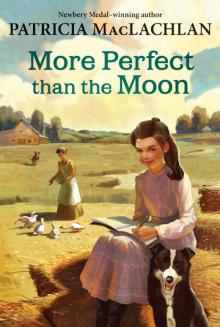 More Perfect Than the Moon
More Perfect Than the Moon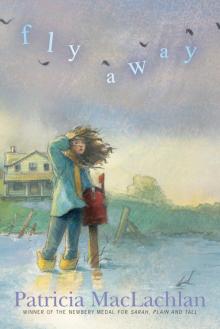 Fly Away
Fly Away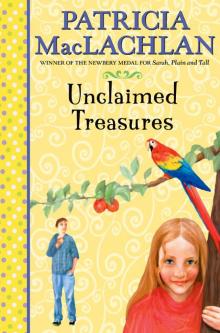 Unclaimed Treasures
Unclaimed Treasures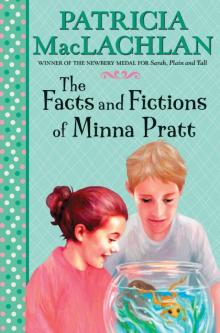 The Facts and Fictions of Minna Pratt
The Facts and Fictions of Minna Pratt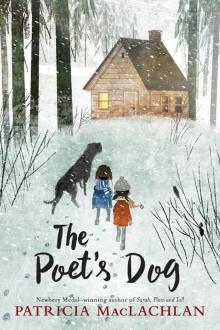 The Poet's Dog
The Poet's Dog Journey
Journey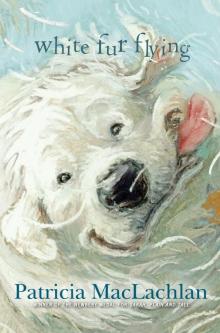 White Fur Flying
White Fur Flying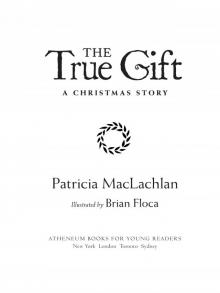 The True Gift: A Christmas Story
The True Gift: A Christmas Story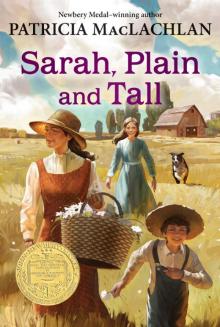 Sarah, Plain and Tall
Sarah, Plain and Tall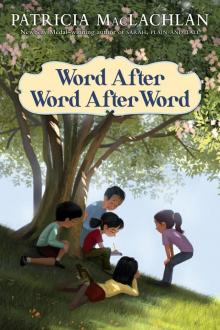 Word After Word After Word
Word After Word After Word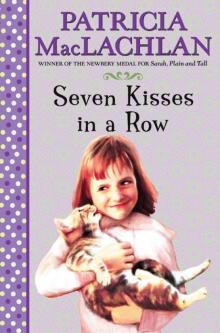 Seven Kisses in a Row
Seven Kisses in a Row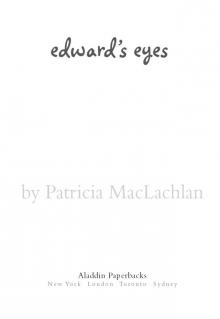 Edward's Eyes
Edward's Eyes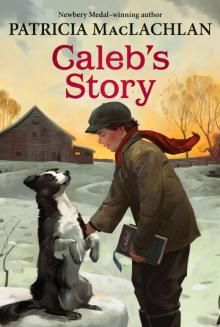 Caleb's Story
Caleb's Story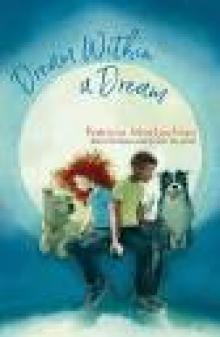 Dream Within a Dream
Dream Within a Dream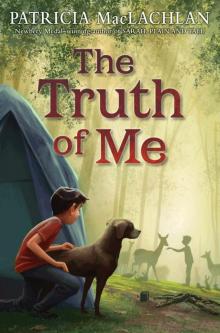 The Truth of Me
The Truth of Me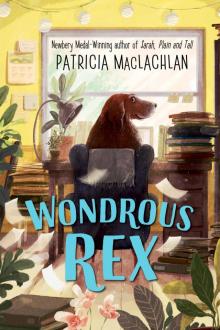 Wondrous Rex
Wondrous Rex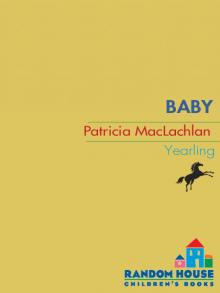 Baby
Baby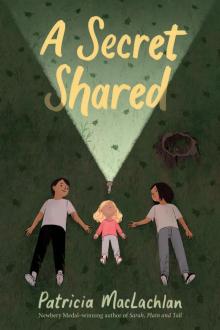 A Secret Shared
A Secret Shared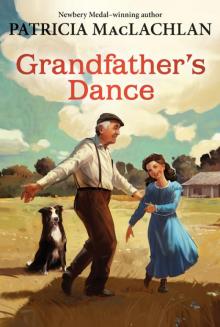 Grandfather's Dance
Grandfather's Dance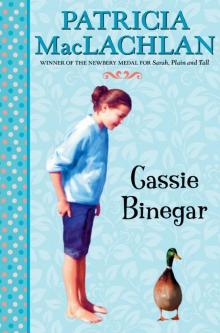 Cassie Binegar
Cassie Binegar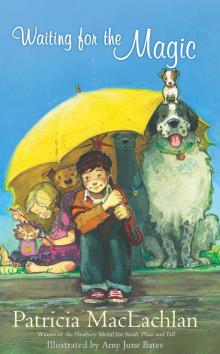 Waiting for the Magic
Waiting for the Magic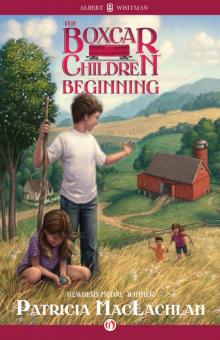 The Boxcar Children Beginning
The Boxcar Children Beginning My Father's Words
My Father's Words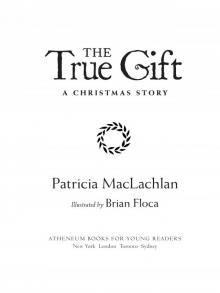 The True Gift
The True Gift